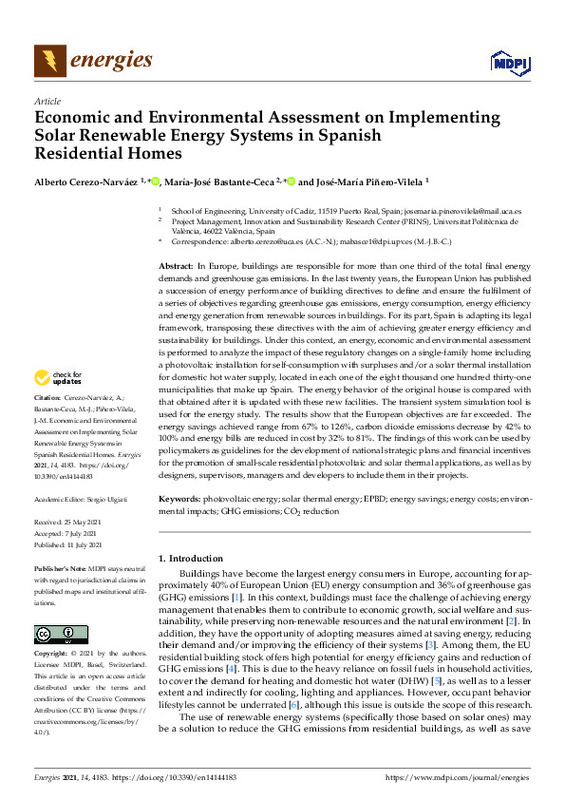JavaScript is disabled for your browser. Some features of this site may not work without it.
Buscar en RiuNet
Listar
Mi cuenta
Estadísticas
Ayuda RiuNet
Admin. UPV
Economic and Environmental Assessment on Implementing Solar Renewable Energy Systems in Spanish Residential Homes
Mostrar el registro sencillo del ítem
Ficheros en el ítem
| dc.contributor.author | Cerezo-Narváez, Alberto
|
es_ES |
| dc.contributor.author | Bastante-Ceca, María-José
|
es_ES |
| dc.contributor.author | Piñero-Vilela, José-María
|
es_ES |
| dc.date.accessioned | 2022-01-24T19:29:48Z | |
| dc.date.available | 2022-01-24T19:29:48Z | |
| dc.date.issued | 2021-07 | es_ES |
| dc.identifier.uri | http://hdl.handle.net/10251/180142 | |
| dc.description.abstract | [EN] In Europe, buildings are responsible for more than one third of the total final energy demands and greenhouse gas emissions. In the last twenty years, the European Union has published a succession of energy performance of building directives to define and ensure the fulfilment of a series of objectives regarding greenhouse gas emissions, energy consumption, energy efficiency and energy generation from renewable sources in buildings. For its part, Spain is adapting its legal framework, transposing these directives with the aim of achieving greater energy efficiency and sustainability for buildings. Under this context, an energy, economic and environmental assessment is performed to analyze the impact of these regulatory changes on a single-family home including a photovoltaic installation for self-consumption with surpluses and/or a solar thermal installation for domestic hot water supply, located in each one of the eight thousand one hundred thirty-one municipalities that make up Spain. The energy behavior of the original house is compared with that obtained after it is updated with these new facilities. The transient system simulation tool is used for the energy study. The results show that the European objectives are far exceeded. The energy savings achieved range from 67% to 126%, carbon dioxide emissions decrease by 42% to 100% and energy bills are reduced in cost by 32% to 81%. The findings of this work can be used by policymakers as guidelines for the development of national strategic plans and financial incentives for the promotion of small-scale residential photovoltaic and solar thermal applications, as well as by designers, supervisors, managers and developers to include them in their projects. | es_ES |
| dc.language | Inglés | es_ES |
| dc.publisher | MDPI AG | es_ES |
| dc.relation.ispartof | Energies | es_ES |
| dc.rights | Reconocimiento (by) | es_ES |
| dc.subject | Photovoltaic energy | es_ES |
| dc.subject | Solar thermal energy | es_ES |
| dc.subject | EPBD | es_ES |
| dc.subject | Energy savings | es_ES |
| dc.subject | Energy costs | es_ES |
| dc.subject | Environmental impacts | es_ES |
| dc.subject | GHG emissions | es_ES |
| dc.subject | CO2 reduction | es_ES |
| dc.subject.classification | PROYECTOS DE INGENIERIA | es_ES |
| dc.title | Economic and Environmental Assessment on Implementing Solar Renewable Energy Systems in Spanish Residential Homes | es_ES |
| dc.type | Artículo | es_ES |
| dc.identifier.doi | 10.3390/en14144183 | es_ES |
| dc.rights.accessRights | Abierto | es_ES |
| dc.contributor.affiliation | Universitat Politècnica de València. Departamento de Proyectos de Ingeniería - Departament de Projectes d'Enginyeria | es_ES |
| dc.description.bibliographicCitation | Cerezo-Narváez, A.; Bastante-Ceca, M.; Piñero-Vilela, J. (2021). Economic and Environmental Assessment on Implementing Solar Renewable Energy Systems in Spanish Residential Homes. Energies. 14(14):1-39. https://doi.org/10.3390/en14144183 | es_ES |
| dc.description.accrualMethod | S | es_ES |
| dc.relation.publisherversion | https://doi.org/10.3390/en14144183 | es_ES |
| dc.description.upvformatpinicio | 1 | es_ES |
| dc.description.upvformatpfin | 39 | es_ES |
| dc.type.version | info:eu-repo/semantics/publishedVersion | es_ES |
| dc.description.volume | 14 | es_ES |
| dc.description.issue | 14 | es_ES |
| dc.identifier.eissn | 1996-1073 | es_ES |
| dc.relation.pasarela | S\449061 | es_ES |
| dc.subject.ods | 07.- Asegurar el acceso a energías asequibles, fiables, sostenibles y modernas para todos | es_ES |
| dc.subject.ods | 11.- Conseguir que las ciudades y los asentamientos humanos sean inclusivos, seguros, resilientes y sostenibles | es_ES |
| dc.subject.ods | 12.- Garantizar las pautas de consumo y de producción sostenibles | es_ES |











